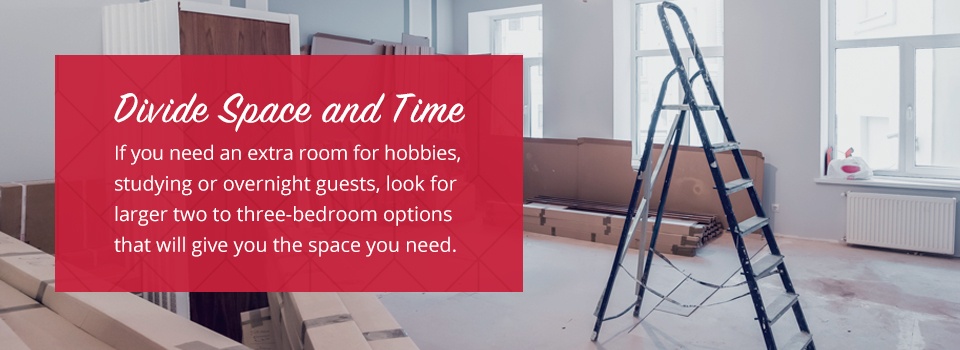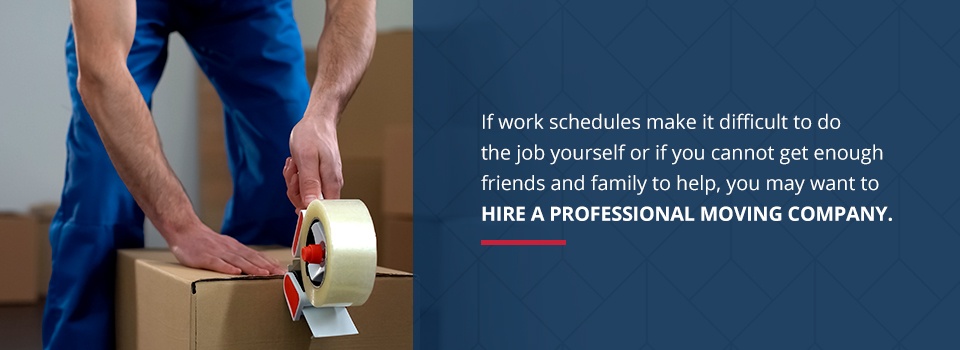

Once you’ve decided on moving in with your significant other, you still have several more decisions to make. The moving process will be a busy one for you and your partner. Though stressful, you will ultimately benefit from the choice in the long run. A study from Ohio State University found that couples cohabitating had the same emotional perks as married partners.
While living together is an emotionally healthy choice, you still must deal with the practical side of things. This guide to moving in with your partner will show you some of the things you must address during and after the move. Don’t start packing until you’ve read through these tips for couples moving in together to help you avoid the most common mistakes people make in the process.
One of the most important things you need to know for how to prepare for moving in with your significant other is what will happen to your furniture and other large appliances. If you and your partner have separate households now, you will need to decide what to keep and what to get rid of. Your new place will likely not have space for two couches and two beds. Before you start tossing furniture into the dumpster, though, consider alternatives that could make you some cash or help you make a difference.
First, you could donate the gently used furnishings to a charity. Doing so can get you a tax break at the end of the year. Plus, you will feel good helping someone less fortunate when you donate your old furnishings. Check with the individual charities because some will not accept used mattresses or certain types of furniture or appliances.
Another option is giving away your furniture to friends or family members. Think about whether you know someone who is moving into an apartment or dorm for the first time and needs furniture but also needs to save money, such as college students.
You may even want to sell the large furnishings from both of your homes and buy one new set for your new place. Host a garage sale or post your old furniture online. When selling the piece, meet in a well-lit public place and have another person with you for safety. Buying new furniture with your significant other solidifies that your new home belongs to you as a couple instead of belonging only to you or your partner.
If your furniture is too damaged or worn out to sell, you may need to discard it. Harrisburg, Pennsylvania, for example, does not allow you to leave televisions outside your home with the trash. You must take them to the recycling center along with all the other electronics you don’t want. The city will recycle them for free. Furnishings have limits if you need to discard in the trash, depending on the items you throw away.

Even though you will live together, you each will still need personal space in your new home. Do you need a separate room for studying or working from home? Does your significant other need a hobby room or entertainment space? Will one closet suffice for you both or will you need two? Do you have pets?
Answering these questions before you choose your new home will help you make a better decision about the type of housing you need. For example, if you need an extra room for hobbies, studying or overnight guests, look for larger two to three-bedroom options that will give you the space you need.
While you don’t expect a guide on moving in together to give you relationship advice, this one does because moving in can test your connection as much as it does your physical space. Don’t forget to also divvy up your time. As much as you care for one another, you both will still need time alone or for friends and family.
Another task you need to do to prepare for moving in with your boyfriend or girlfriend is looking at finances. The likelihood that you and your significant other make the same amount is low. In most relationships, one person will make more than the other. Take this into consideration when dividing the bills and household expenses.
If your incomes are close, you can divide the bills evenly. However, if one of you makes considerably more than the other, that person will need to pay a proportionate amount of the expenses. For example, if you make $25,000 and your partner makes $50,000, your significant other may pay two-thirds of the total for the bills while you cover the remaining one-third. This division allows you to pay proportionate amounts of your income without feeling overwhelmed.
When dividing the expenses, you may assign bills to each person. Or you could split the amounts evenly and transfer money to the person paying the bill. Another option is to open a joint bank account that you both contribute to and use that money for the shared expenses.
Also, discuss your spending habits. You may avoid an argument if you discover early that one of you prefers saving while the other spends lavishly. Agree on what you will want to save and spend, especially if you share an account.

Among the steps you must take when you prepare to move in together is choosing your method for the move itself. Decide whether you will do the work yourself or hire a company. If you and your significant other both are leaving your current homes and moving into a new place together, you may consider a moving company to help you with handling two households filled with personal effects.
If one of you moves in with the other, you may still want to use a moving company depending on the amount of time and effort you have to dedicate to the move. If work schedules make it difficult to do the job yourself or if you cannot get enough friends and family to help, you may want to hire a professional moving company.
You can select a DIY option but be ready to offer your friends and family a lot of pizza in reward for their efforts. Also, be willing to reciprocate their favors in the future when they need to move.
When trying to manage all of the logistics of moving in together, it’s easy to forget to consider what your daily lives will be like after the move. If you are a night owl and your partner is a morning lark, you may find yourselves at odds when it comes to bedtime and waking. Work out these differences in addition to work schedules and social events before you move in together.
Don’t expect to have complete attention from your partner. Your significant other will still have a life of his or her own that will continue regardless of where you both live. Be respectful of each other’s time. Doing so will make the time you spend together even more important and intimate.
A critical decision you must make before or after the move is the type of mattress you both sleep on. Buying a new mattress will help you both sleep better. To get the right one, you need to go to the store together to try various models.
Choose a model big enough to give you both plenty of space to sleep. You won’t want to cuddle close together every night and choosing a larger bed size will ensure you don’t feel your personal space is getting invaded at night.
When you have a new bed that you can agree upon and both sleep comfortably, you will enjoy better sleep as a couple. With you both well-rested, you will be less likely to have the irritation and snappish arguments common in those who do not sleep well.

If you previously lived by yourself, you had to do all the cooking and cleaning. If you didn’t, no one else would do the work for you. With a partner, you will need to divide up the household chores as evenly as possible.
Though you can split the tasks up, with two people, there will be more to clean. You will have twice the amount of laundry and twice the number of dishes to wash.
Discuss with your partner which chores you feel willing to take and which you prefer not to do. Some jobs, like cleaning the bathroom, neither of you may want, but you can alternate who does such tasks or do them together.
While discussing chores, talk to your significant other about acceptable levels of cleanliness. Is it okay to leave dishes in the sink overnight? Does it matter if dirty clothes don’t always make it into the hamper right away? Does every room in your home have to have the same level of tidiness? Can you allow clutter to accumulate in closets? What about bedrooms or spare rooms?
If you are usually a neat freak, you may need to back off your level of acceptable cleanliness while your partner needs to learn to be tidier. As a couple, you will find this to be only one area where you two may need to find a compromise between your personal preferences.
If you have enough money between the two of you and not enough time for all the household chores, consider hiring a professional cleaner. You can choose weekly or monthly cleaning and set a schedule that works for your budget and lifestyle.
Even if you think you know how to prepare for moving in with your significant other, you may not be ready for the emotional effects of the move. Moving always brings a considerable change to your life, and moving in with another person can add to the stress levels. Too much stress can affect your mood and sleep patterns. You will need to work to prevent these effects in yourself and your partner.
When you and your significant other move in together, you will each need some time to adjust to the relocation. You both will have left your old place, habits, friends and schedule. Adapting to living with another person will take time.
The farther from your original home you moved, the more pronounced the effect may be. Moving across the country and starting at a new job or school is more disruptive to your life than relocating across town. You will need to adapt to changes in your life you may have never considered. Living in a new state means new state laws, for instance. Your significant other likely feels as uncertain and uncomfortable as you do.
To help each other through this time, remember to be kind. When you get home tired from work and feel upset about something, step away from your partner until you cool off if that’s what you need. If your partner needs someone to talk through a problem with, take the time to be there for them.
Of course, you want your relationship to last forever, but even the best arrangements may fall through. You need to have a plan in case you and your partner find that living together will not work out.
Even before you sign the lease, you can facilitate the moving out process by deciding who will stay in the home and who will leave should you separate. The person who will remain in the home should put his or her name on the lease. Having only one name on the rental agreement will make it easier if one of you needs to leave in the future.
Another thing you can do to help ease the moving out process is identifying rules of your home. Will you include any deal-breakers that will require you to separate? Are cheating, abuse or neglect among the factors that will lead to a separation? Decide now so you will have fewer problems later. Hopefully, you will never need to use this plan. However, just as you should prepare your home for a natural disaster that you hope never happens, you should also ready yourselves for a relationship disaster.
The journey does not stop here. For more tips on renting with your significant other, check out our blog. You’ll also find insider information on the best things to see and do in the Harrisburg area as well as great restaurants and other secrets the locals know. If you know you want to move to the area, you and your significant other will need a place to live.
Find your next home in one of our Triple Crown Corporation communities. We offer homes for a variety of needs, including studio apartments, townhomes, one to three-bedroom homes and even pet-friendly communities. With convenient locations in Harrisburg, Mechanicsburg, Camp Hill, New Cumberland and Middletown, you and your significant other will be sure to find the perfect place for you and your partner.